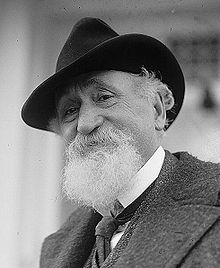Career
Maxim started his career in 1881 as the publisher of Real Pen Work - Self Instructor in Penmanship, a book addressing the arts of calligraphy and penmanship, and the sale of special inks, pens, and other supplies related to penmanship. Later he joined his brother Hiram Stevens Maxim's workshop in the United Kingdom, where they both worked on the improvement of smokeless gunpowder. After some disputes, Hudson Maxim returned to the United States and developed a number of stable high explosives, the rights of which were sold to the DuPont company.
Maxim wrote a book, Defenseless America, first issued in 1912, in which he pointed out the inferiority of the American defense system and the vulnerability of the country against attacks of foreign aggressors. At that time, the United States army according to Maxim, had a total strength of 81,000 men of which 29,000 were assigned to man coastal artillery batteries at major ports. This explains the need for the United States to use National Guard troops in its campaign against Mexico in 1916. The book was reissued in 1916 after his good friend, Elbert Hubbard, died on the RMS Lusitania when it was torpedoed by a German submarine. This event fueled his belief that the USA should improve its defenses and join the war against Germany on the side of the Entente.
Maxim also wrote the book The Science of Poetry and the Philosophy of Language about the nature and writing of poetry. In this work, he contended that words, like chemical particles, had natural laws that governed the manner in which they could be combined into verse, and that poetry perceived as excellent was in fact one that conformed to those laws. He also argued that certain famous poets (William Shakespeare, William Wordsworth) had discovered those laws and put them to use in their poetry.
During his experimental career, he lost his left hand in a mercury fulminate explosion in 1894.
